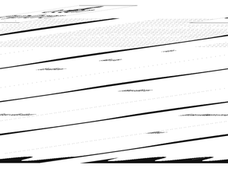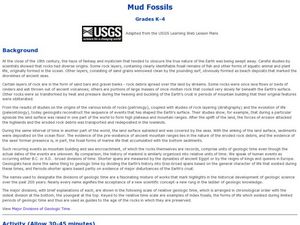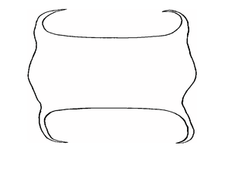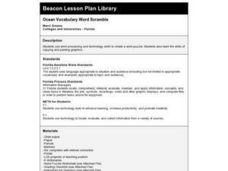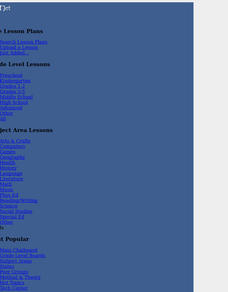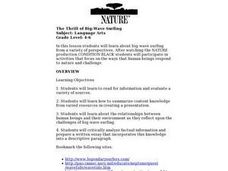Curated OER
Under the Blood-Red Sun
Fifth graders explore U.S. history by reading an award winning book about World War II. In this Japanese internment camp lesson, 5th graders read the book Under the Blood-Red Sun and discuss the entrapment of Japanese-Americans on our...
Curated OER
AFRICAN-AMERICAN HOMESTEADERS
Students analyze the factors that inhibited and fostered African American attempts to improve their lives during Reconstruction, the role of class, race, gender, and religion in western communities, and the challenges diverse people...
Curated OER
Candy Chemosynthesis
Students explain chemosynthesis and photosynthesis using candy. In this chemosynthesis instructional activity, students work cooperatively to create a visual explanation of the chemical equations of photosynthesis and chemosynthesis.
Curated OER
Mud Fossils
Students observe real fossils. In this science lesson, students make their own mud fossils by pressing material into the mud and letting it dry in the sun for 3-4 days. Students then get the fossils out displaying their mud...
Curated OER
Skates
Students gain understanding of structure, characteristics, and basic needs of living things and their role in world, identify parts of skate, observe details of skate's body and skate egg case, and identify unique characteristics of skates.
Curated OER
Exploring Deep Ocean Habitats: Alien Invasion
Students compare and contrast "alien species" and "invasive species."Students explain positive and negative impacts associated with introduction of non-native species, and give a specific example of species that produce t
Curated OER
Life on the Edge: Exploring Deep Ocean Habitats Cool Corals
Students research the basic morphology of Lophelia corals and polyps to determine the significance of these organisms. They detail the reasons that biological communities are focusing on the Lophelia corals as major conservation efforts.
Curated OER
Iona Wastewater Treatment Plant Field Trip
Students go on a field trip to the Iona Wastewater Treatment Plant and learn about sewage, waste, and pollution. For this treatment plant lesson plan, students also complete collection samples of quadrats.
Curated OER
The Ocean: A Watery World
Students discuss the proper clothing for the season. They make wind chimes to use as an indicator of movement of the air and observe and identify the various cloud formations. They determine the basic rules of storm safety and discuss...
Curated OER
Ocean Vocabulary Word Scramble
Students visit a puzzle maker website and follow a list of instructions, creating a word scramble using sea animal vocabulary. They copy and paste graphics at the bottom of their puzzle, and print them out for other students to solve.
Curated OER
Who Lives in the Sea? A class book (Elementary, Science)
Students, assigned an alphabet letter, do research on a sea animal whose name begins with that assigned alphabet. All of the assignments then be turned into a class book.
NOAA
Importance of Deep-Sea Ecosystems – How Diverse is That?
When judging diversity of an ecosystem, both species evenness and species richness must contribute. After a discussion of diversity and a guided example using the Shannon-Weaver function, scholars use the same function on two other...
US Environmental Protection Agency
Carbon Through the Seasons
Meteorologists view an animated video by the Environmental Protection Agency to learn how the carbon cycle works, and then move into groups to analyze and graph actual data of the atmospheric carbon dioxide concentration from Hawaii's...
National Wildlife Federation
I Speak for the Polar Bears!
Climate change and weather extremes impact every species, but this lesson focuses on how these changes effect polar bears. After learning about the animal, scholars create maps of snow-ice coverage and examine the yearly variability and...
Channel Islands Film
Island Rotation: Lesson Plan 3
How far have California's Channel islands moved? What was the rate of this movement? Class members first examine data that shows the age of the Hawaiian island chain and the average speed of the Pacific Plate. They then watch West...
Curated OER
Researching the World's Oceans
Students research and compare important features of the oceans based on current data. They examine the globe or map, determine the major oceans of the world, and record their names on the data sheet.
Curated OER
Just Jelly
Students identify common gelatinous zooplankton in the Canada Basin and their ecological role. They compare and contrast feeding strategies of at least three different types of gelatinous zooplankton.
Curated OER
Oceanography
Fifth graders study the topography of the ocean floor. They determine its ever changing nature as they examine currents and trade winds. They write paragraph describing how the winds might affect land formations after the discussion of...
Curated OER
Survival of the Fittest
Sixth graders create their own "never before seen" marine creatures and examine how not all creatures in the sea swim, not all have sharp teeth
Curated OER
Oceanography Class Quilt
Students create and observe a collage of oceanography topics that be placed on quilt tiles in a culmination art project to represent information learned.
Curated OER
AUSTRALIA
Students examine the different types of barrier reefs and how they are formed. In this barrier reef lesson plan students complete several activities on coral reefs.
Curated OER
The Thrill of Big-Wave Surfing
Learners view a PBS Nature program about big-wave surfing and participate in a class discussion about their experiences with surfing, body boarding, or body surfing. Students create a drawing based on a reading and post their art around...
Curated OER
Kure Waste Chase Game Lesson
Learners work together to identify marine debris. They explain the effect of the debris on various ecosystems. They draw different types of ocean currents as well.
Curated OER
Voyage to Kure Viewing Guide
Students complete a worksheet while viewing a video about the oceans. They locate the oceans on a map and identify positive and negative ways in which humans have impacted them. They discuss any questions at the end of the lesson.




